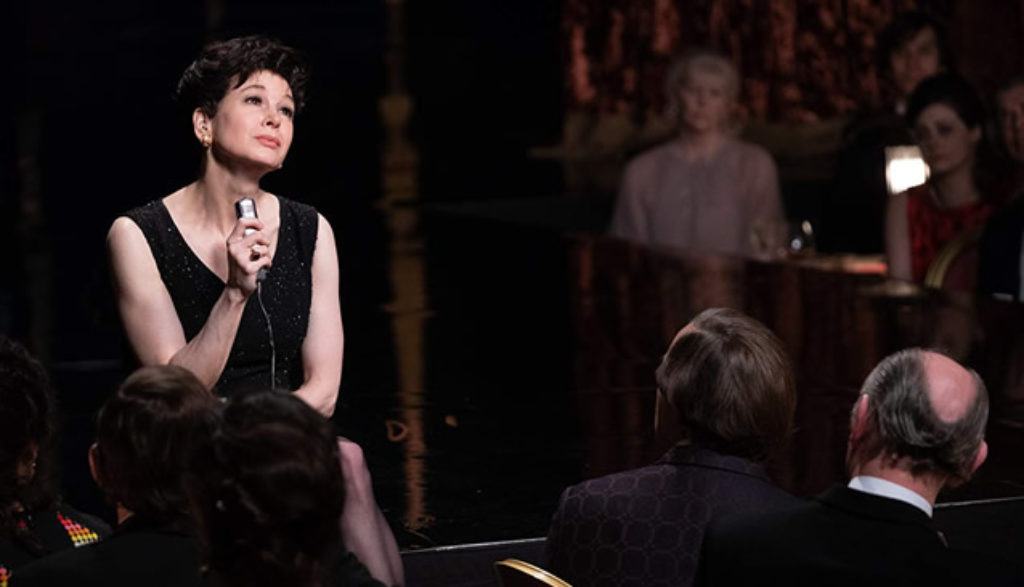
Everyone knew about Dorothy, the yellow brick road and that magical place somewhere over the rainbow. But how many people actually knew Judy Garland, the beloved face and voice of Dorothy? Not many.
Still, nearly three decades later, there isn’t really anybody who can say that they truly understand Judy. Sure, she’s wildly famous and beloved around the world. But her career has taken a slow, tragic descent since her time at MGM Studios.
She’s now a struggling single mom dabbling in random singing gigs to support her children. But with no stable home and no real income, Judy is forced to make a decision: stay in the United States and struggle to provide for her kids, or go to London for a series of concerts to reclaim her name and earn some much needed cash.
In the end, Judy decides to fly across the pond, where she is greeted by a mixture of adoring fans and vicious critics. And, unfortunately, not even this second chance at fame can suppress her destructive habits or erase the demons of her past.
Judy Garland is a kind but troubled woman. Throughout the film, she struggles to love people well, largely because she doesn’t really understand how to love herself or how to work through the years of possible sexual abuse we learn that she endured earlier in her life. However, Judy is quick to make a few friends. She feels loved and heard, specifically by two of her most devoted fans.
Judy fights to keep her children, even when her methods aren’t best suited for her kids. Though she was forced to move her children around a lot when they were younger, it’s also clear that she truly loves them and wants what is best for them. This becomes evident when her daughter says she wants to stay in a stable home with her father, Sidney Luft. Although that separation from her daughter breaks Judy’s heart, she ultimately wants her children to be safe and happy.
Judy tells a friend that having kids is like “living with your heart outside your body.” Judy consoles her two youngest children and puts on a brave face even when she is emotionally struggling. Judy talks about the necessity of hope during one of her performances. A few friends take the time to honor Judy and love on her, even when she treats them poorly.
Sidney Luft, one of Judy’s ex-husbands, tells Judy he wants custody of his kids during the school year to give them a stable home where they’re able to make friends and build a consistent, healthy schedule.
A director references people who attend church.
The film never shows Judy being sexually abused by any MGM managers or producers, but it does suggest that may have occurred. In one scene, Judy is pulled aside and an MGM producer tells her, quite closely, that she is his “favorite.” Later, he towers over her, indimating her while stroking her upper chest.
Two diehard fans of Judy’s talk to her about how difficult their life has been together as a gay couple (one of the men admits they were both imprisoned for a short stint because of their sexuality). Framed pictures show the two embracing and kissing each another on the cheek.
After Judy marries her fifth husband, Mickey Deans, she wears a revealing and clingy silk nightgown while sitting in the bathroom. Dancers sport leotards during a performance. Couples kiss, flirt and dance at a house party.
Mickey, Judy’s husband, throws a glass of hard liquor against the wall in anger as they argue. While at a doctor’s appointment, Judy admits that she tried to commit suicide two years prior. At the end of the film, a postscript tells us that Judy died at the age of 47.
God’s name is abused three times, including a couple of pairings with “d–n.” Jesus’ name is misused once. The f-word is heard twice and the s-word once. Other profanity includes a few utterances each of “h—,” “son of a b–ch” and “b–tards.” Someone is referred to as a “f-ggot.”
It’s no secret that Judy Garland struggled with drug and alcohol abuse throughout her life, and the film shows that some of those addictions began at a young age. When Judy asks for food as a young girl on set, she’s told instead to “take a pill” to curb her hunger as well as to sleep; producers and managers are the ones giving Judy unlabeled pills.
As Judy becomes an adult she continues to take pills (most of them are unlabeled throughout the film) and to drink a variety of alcohol. In one scene, her young daughter asks her not to take the pills that make her fall asleep. Later still, Judy is seen taking a variety of pills before shows and during the day to cope. She’s obviously under the influence of drugs and/or alcohol in multiple scenes as she struggles to perform on stage. A few audience members ridicule Judy about her obvious intoxication.
Similarly, Judy and other people smoke cigarettes and drink hard liquor, mixed drinks, champagne, wine and beer. There are various references to intoxication, and a few people are seen passed out after a night of partying.
Judy seeks to have a normal life outside the world of showbiz, but it’s clear that producers and the entertainment industry take advantage of her, abusing her emotionally and mentally. A specific male producer constantly degrades young Judy, telling her she should want fame instead of settling to be “just a mother” or “just a housewife.” He also reminds her that there are plenty of “prettier” girls with talent in order to manipulate Judy into staying in the business. Other people control young Judy’s every move, including restricting her diet and giving her sleeping pills instead of addressing her real issues. This leads Judy to struggle with insomnia throughout her entire life.
Judy, although known for her difficult personality, breaks down during a performance as she sings about the pains of loneliness and the weight of broken dreams. She’s pelted with food and other objects during a few unsuccessful performances.
Judy is sent to see a doctor while in London and tells him she’s taken “four husbands” for depression. An interviewer suggests that Judy is a terrible mother.
Judy Garland reached desperately for hope amid deep brokenness. But she was always too far away to grasp the beauty over the rainbow.
This biopic is a tragedy at its core, but one that still delivers poignant glimpses of an icon’s longing for happiness. Renée Zellweger gives an incredible, heart-wrenching performance, while fellow cast members play their parts well, too. Zellweger shows us how Judy was a fighter, albeit it a damaged one, right up to her tragic death in 1969.
Drug abuse is prevalent here but not too graphic. Likewise, language is restrained, as are suggestions of the abuse that Judy Garland likely endured. Those storytelling decisions steer this drama clear of R-rated content and comfortably into PG-13 territory.
That said, there really isn’t much redemption here. And that makes Judy a hard film to watch—especially if you’re expecting the kind of happy ending this beloved actresses’ films always had.

Kristin Smith joined the Plugged In team in 2017. Formerly a Spanish and English teacher, Kristin loves reading literature and eating authentic Mexican tacos. She and her husband, Eddy, love raising their children Judah and Selah. Kristin also has a deep affection for coffee, music, her dog (Cali) and cat (Aslan).